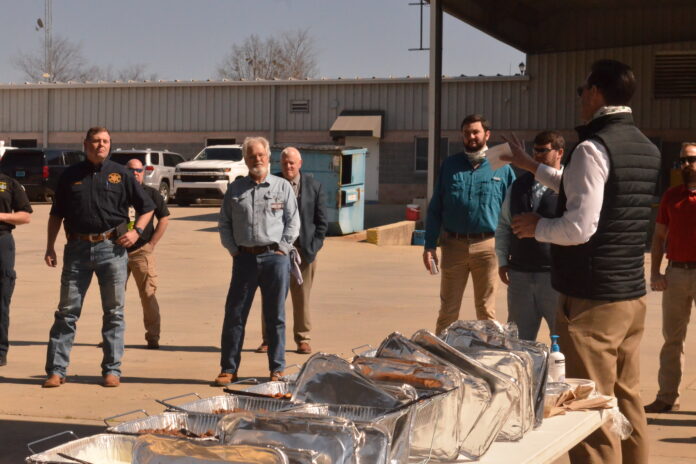
CULLMAN, Ala. – With the 10-year anniversary of the destructive April 27, 2011 tornadoes approaching, Cullman Electric Cooperative (CEC) hosted a meeting with local law enforcement and emergency management leaders Thursday to discuss the upcoming spring storm season and how things have changed since that day nearly a decade ago.
Cullman County Emergency Management Agency (EMA) Director Phyllis Little kicked things off by thanking all those in attendance for the work they do to keep people safe within the community when disasters hit.
“You all know that the 10th anniversary of the April 27, 2011 tornadoes is coming up and the goal here is just to give everybody an opportunity, no. 1, to get out of the house from COVID and no. 2, to honor our first responders with a good meal, especially those folks that were with us and responding during that time,” Little said. “We all remember how chaotic it was and how quickly our communities came together for anybody that needed help. I just want you all to know how much I appreciate what you do; I appreciate what the guys at the co-op here do to keep my power on and I just want you to know you are appreciated. If you ever need anything from our office at any time, please call us and let us know.”
CEC Manager of Communications & External Affairs Brian Lacy picked up where Little left off, reflecting on the decade that has passed since the devastating storms and how the co-op has changed in that time.
“As Phyllis and I were talking about doing this and with the 10-year anniversary of April 27 coming up, we just thought it would be a good time to reflect on how things have changed and some of the lessons that we learned from that time across each of our departments,” Lacy said. “I got together with our team here at the co-op and we just talked about what we learned from that experience and how things changed here over the last 10 years. Our first thing is that it’s been 10 years since we’ve experienced anything like that so we’re thankful for that.”
Lacy said the co-op has experienced a high level of turnover these last 10 years, but he believes the infusion of new voices and ideas has helped the co-op develop and improve.
“We have a little over 100 employees that work here at the co-op and as of today more than half of the people who work here right now, did not work here in April 2011. That’s a huge amount of turnover for our company. Without looking at the records I would assume that we’ve never had a decade at the co-op that had that much turnover,” Lacy said. “So obviously, we’ve lost a lot of knowledge, but we feel like what we have gained in those new employees is a lot more valuable in terms of new energy and new ideas on how we approach things. We have a completely different philosophy in how we handle outage management and that comes from a lot of these new people that weren’t here at that time. I think all these guys that are here with me and work downstairs in operations will tell you that we’ve got better teamwork and a more diverse set of skills here at the co-op than we had 10 years ago.”
Fortunately, Cullman has avoided another disaster of that scale in the past decade, but Lacy explained that CEC linemen have still been gaining experience by helping with those situations elsewhere.
“Our linemen have a ton of experience dealing with disasters like that. We have a great mutual aid network, and our linemen help other co-ops all across the state. They’ve made many trips down to the coast for hurricanes over the last decade; they go up to Kentucky and the Midwest for ice storms, and they spent some time this past year in Louisiana with hurricanes as well, so our guys get a lot of experience working in those type of disaster recovery situations,” he said. “We’ve also got great connections and we know that the next time we have something like that happen here, we’re going to have people from other co-ops across that state and the region that will be here at a moment’s notice if we need them.”
Another big part of the co-ops growth has been a shift in technology. Lacy went through some of the updates that have been made in the last decade and how they’re helping the co-op manage outages and other events.
“Technology has changed dramatically here at the co-op. We’ve got a new dispatch system- a new phone system for people calling in and reporting outages- you can report your power outage by text message now,” Lacy said. “We’ve got the ability with the staking software we use for guys in the field to send in pictures from their phone that go directly to our office so our guys here can assess damage instantly. Our warehouse folks have just put in a new barcoding system that’s going to help us manage inventory the next time this happens, too. So, the technology leap we’ve made in 10 years has completely revitalized things since the last time we had a major event.”
Cullman County Sheriff Matt Gentry spoke next and began by thanking all the agencies and their employees for the work they do. Gentry went on to say that the teamwork between these agencies is what will help the most if and when the next disaster does strike.
“I think one of the blessings we have in Cullman County is teamwork. During the 2011 tornadoes, I was assigned at DEA at the time and still working narcotics, but we came up as a group and figured it out and worked together,” Gentry shared. “I think that’s one of the great attributes we have in Cullman is the willingness to do everything it takes to get the mission accomplished together. I think as long as we continue to instill that every day, then no matter what the disaster is, we’ll be very successful as a community. We do it as team, and I think that’s one of the most important things that all of us as leaders can instill within our agencies.”
Cullman Police Chief Kenny Culpepper was at the meeting as well and reiterated the benefits of participating in the mutual aid program. He said it allows local first responders to provide aid to others, but it also provides invaluable experience and relationships when your own community is affected by a disaster.
“Like Brian said, we’re part of the mutual aid system, and what really benefited us in 2011 was that about 80% of my officers had already been down to the Gulf and had experience dealing with a disaster. They were used to working with the National Guard, they were used to working with other agencies, and it didn’t take us long to figure out that the linemen had the best base camps and the best food,” Culpepper joked. “We went there to try and mooch off their food because we weren’t as prepared as the electric companies were.”
He continued, “We had our chiefs’ conference last week, and in our new chiefs’ mentoring session that’s one of the things I always tell them: you need to participate in mutual aid. Don’t complain about being shorthanded and how much it’s going to cost because it’s going to pay dividends when you have a disaster yourself. You’re going to know what to do, your men are going to know what to do and you’re also making those relationships with other agencies. When south Alabama came up here in 2011, we already knew those guys because we had gone down there and worked with them before, so it was every easy for us to coordinate law enforcement. One other thing that we really learned then is that when it’s your disaster, you’re not only working the disaster, you’re worried about your families. You have to work out a plan to take care of your employees’ families so they can do their job and not be worried about their wives and kids and moms and dads.”
Copyright 2021 Humble Roots, LLC. All Rights Reserved.






























